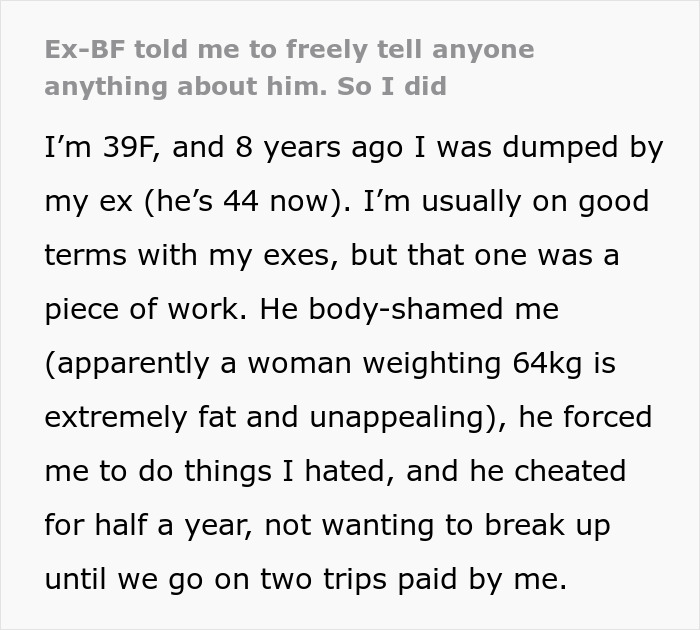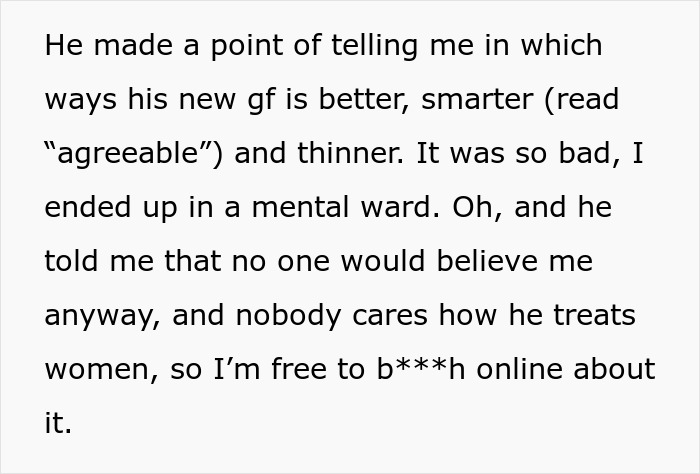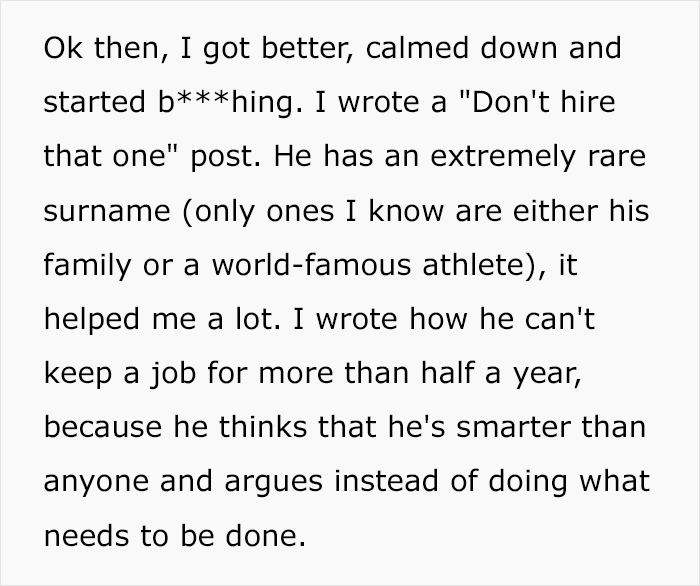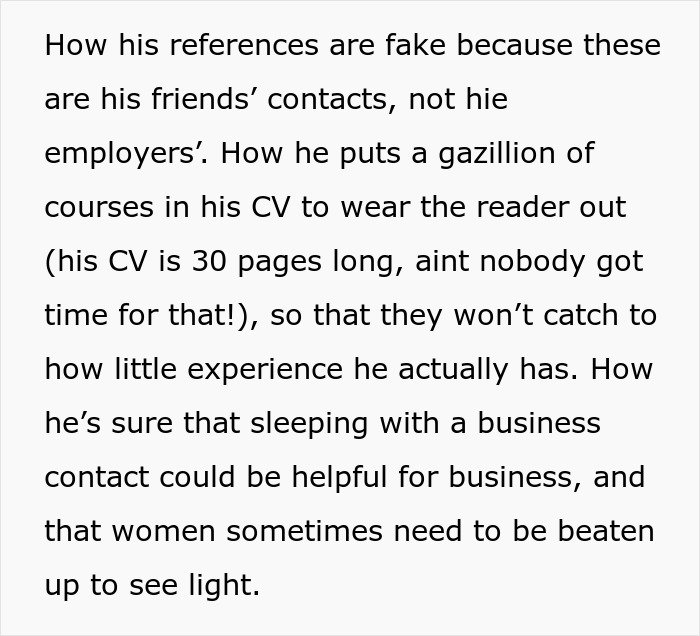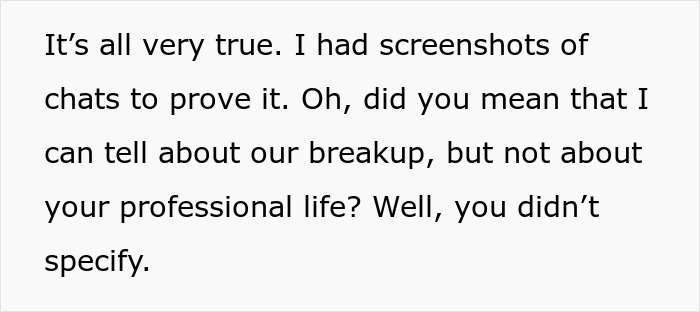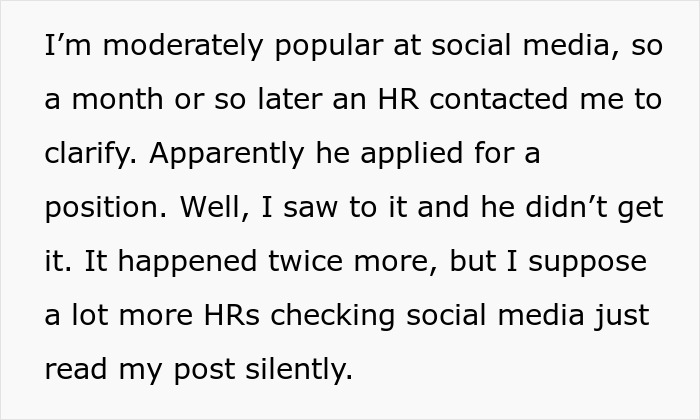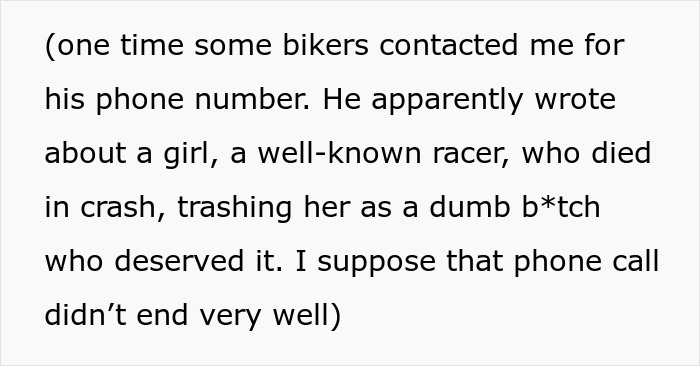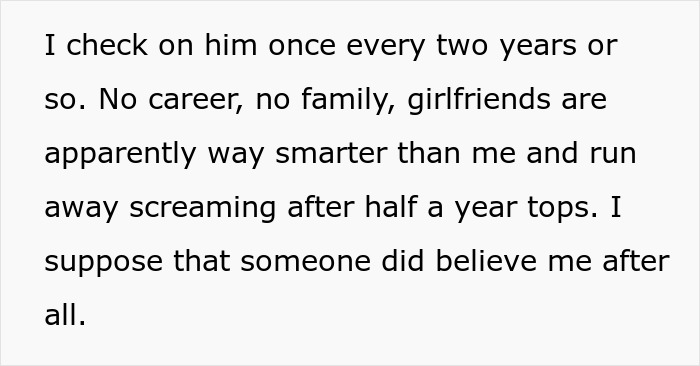Ex Tells Woman No One Will Believe Her Stories About Him, Regrets It After She Ruins His Career
Most relationships might seem rosy from the outside. However, the statistics are quite harrowing. The National Domestic Violence Hotline reports that almost half of women (48.4%) and men (48.8%) in the US have experienced psychological aggression by an intimate partner. Sometimes, the victims might choose public revenge to make themselves feel better and let others know what kind of person their ex is.
The OP in this story decided to do a similar thing. After she and her ex-boyfriend ended things badly, he told her no one would believe her anyway and “nobody cares how he treats women,” so she’s free to talk about it online. When she heard that, the OP maliciously complied.
Sometimes, an ex might do you so dirty that you want the whole world to know what kind of person they are
Image credits: Skylar Kang / pexels (not the actual photo)
This woman decided to use the Internet as a tool in her revenge against a toxic ex-boyfriend
Image credits: Windo Nugroho / pexels (not the actual photo)
Image credits: Tima Miroshnichenko / pexels (not the actual photo)
Image credits: Karolina Grabowska / pexels (not the actual photo)
Image credits: Emergency-Housing547
Public shaming online can sometimes be punishable by law
What the OP describes above seems like a very unhealthy relationship. And while most people can see that the boyfriend did not treat the OP right, experts say that publicly shaming your ex is rarely the way to go about healing from a toxic relationship.
One commenter already asked the OP whether there are any laws in her country on defamation or slander. She responded by saying that a similar law applies but only if the information is false. And she claims she can prove everything she claimed in her posts. “It also only applies to mass media, which I’m not,” the Redditor wrote. Although she has a certain following on social media, it’s not enough to classify as mass media.
Internet defamation attorneys at Minc Law write that those in the US who shame people publicly online might face legal consequences. In their terms, online shaming includes defamation, online harassment, cyberbullying, and invasion of privacy.
The Dutch Senate, for example, recently made doxing a crime (and revealing someone’s name and other personal information publicly does count as doxing). It’s mostly to protect public figures, such as activists, first responders, journalists, and politicians. Similar laws apply in South Korea, Hong Kong, and some U.S. states, such as California.
Image credits: Peter Olexa / pexels (not the actual photo)
Law and relationship experts agree: When hurt by an ex, opt for a different strategy
Minc Law recommends dealing with the person who hurt you, like a cheating ex, in other ways. One of them is to confront the person privately. “Sharing your feelings with a cheating ex will get you a lot closer to closure than posting negative content online. Better yet, you will gain the opportunity to learn and move on without fear of a lawsuit for cyberbullying or defamation,” they write.
If it’s possible, try pursuing legal action. This is especially important in cases of physical violence. Minc Law writes that shaming someone for it online could negatively interfere with the legal pursuit of a case. Also, just posting the incident online will not prevent the individual from harming someone else in the future.
Another solution is to take the high road. While it doesn’t sound as sweet as revenge, it might be in your best interest. This way, you won’t be liable for a potential criminal or civil lawsuit from the ex-partner.
Relationship experts offer similar advice. Relationship coach Stephanie Rigg told The Sydney Morning Herald that posting on social media after any kind of breakup is a big no-no. “Take the high road, act with integrity, and preserve your dignity,” she said, echoing the advice above.
It’s natural to want to get back at an ex after they hurt you. However, things like public shaming online are often the result of acting out of anger. Rigg said that such rash decisions might leave you with “a shame hangover.”
Image credits: Alena Darmel / pexels (not the actual photo)
The best strategy after a toxic relationship is to go no contact
Posting about your trashy ex might save you the emotional labor of reliving the breakup again and again. But experts recommend directing your grievances elsewhere. Stephanie Moulton Sarkis, Ph.D., and the author of Gaslighting: Recognize Manipulative and Emotionally Abusive People—and Break Free, writes that this is the first step towards getting over an unhealthy relationship.
If you’re feeling lonely, reach out to a trusted person. The toxic relationship might isolate you from your close friends and family, so this is the time to reconnect. Another strategy might be to reach out to a mental health professional. “When you have been through a toxic relationship, you may experience symptoms of post-traumatic stress disorder,” Sarkis writes.
“An MHP can help you process what happened and let you know it’s not your fault. An MHP can also help you through any feelings of anger or disappointment towards yourself. They can also help you with the complicated feelings of grief that you may experience after a toxic relationship has ended,” Sarkis wrote for Psychology Today.
Image credits: SHVETS production / pexels (not the actual photo)
The commenters had a lot of questions, so the OP addressed some of their concerns
Here are the reactions from other people
[ad_2]
Most relationships might seem rosy from the outside. However, the statistics are quite harrowing. The National Domestic Violence Hotline reports that almost half of women (48.4%) and men (48.8%) in the US have experienced psychological aggression by an intimate partner. Sometimes, the victims might choose public revenge to make themselves feel better and let others know what kind of person their ex is.
The OP in this story decided to do a similar thing. After she and her ex-boyfriend ended things badly, he told her no one would believe her anyway and “nobody cares how he treats women,” so she’s free to talk about it online. When she heard that, the OP maliciously complied.
Sometimes, an ex might do you so dirty that you want the whole world to know what kind of person they are
Image credits: Skylar Kang / pexels (not the actual photo)
This woman decided to use the Internet as a tool in her revenge against a toxic ex-boyfriend
Image credits: Windo Nugroho / pexels (not the actual photo)
Image credits: Tima Miroshnichenko / pexels (not the actual photo)
Image credits: Karolina Grabowska / pexels (not the actual photo)
Image credits: Emergency-Housing547
Public shaming online can sometimes be punishable by law
What the OP describes above seems like a very unhealthy relationship. And while most people can see that the boyfriend did not treat the OP right, experts say that publicly shaming your ex is rarely the way to go about healing from a toxic relationship.
One commenter already asked the OP whether there are any laws in her country on defamation or slander. She responded by saying that a similar law applies but only if the information is false. And she claims she can prove everything she claimed in her posts. “It also only applies to mass media, which I’m not,” the Redditor wrote. Although she has a certain following on social media, it’s not enough to classify as mass media.
Internet defamation attorneys at Minc Law write that those in the US who shame people publicly online might face legal consequences. In their terms, online shaming includes defamation, online harassment, cyberbullying, and invasion of privacy.
The Dutch Senate, for example, recently made doxing a crime (and revealing someone’s name and other personal information publicly does count as doxing). It’s mostly to protect public figures, such as activists, first responders, journalists, and politicians. Similar laws apply in South Korea, Hong Kong, and some U.S. states, such as California.
Image credits: Peter Olexa / pexels (not the actual photo)
Law and relationship experts agree: When hurt by an ex, opt for a different strategy
Minc Law recommends dealing with the person who hurt you, like a cheating ex, in other ways. One of them is to confront the person privately. “Sharing your feelings with a cheating ex will get you a lot closer to closure than posting negative content online. Better yet, you will gain the opportunity to learn and move on without fear of a lawsuit for cyberbullying or defamation,” they write.
If it’s possible, try pursuing legal action. This is especially important in cases of physical violence. Minc Law writes that shaming someone for it online could negatively interfere with the legal pursuit of a case. Also, just posting the incident online will not prevent the individual from harming someone else in the future.
Another solution is to take the high road. While it doesn’t sound as sweet as revenge, it might be in your best interest. This way, you won’t be liable for a potential criminal or civil lawsuit from the ex-partner.
Relationship experts offer similar advice. Relationship coach Stephanie Rigg told The Sydney Morning Herald that posting on social media after any kind of breakup is a big no-no. “Take the high road, act with integrity, and preserve your dignity,” she said, echoing the advice above.
It’s natural to want to get back at an ex after they hurt you. However, things like public shaming online are often the result of acting out of anger. Rigg said that such rash decisions might leave you with “a shame hangover.”
Image credits: Alena Darmel / pexels (not the actual photo)
The best strategy after a toxic relationship is to go no contact
Posting about your trashy ex might save you the emotional labor of reliving the breakup again and again. But experts recommend directing your grievances elsewhere. Stephanie Moulton Sarkis, Ph.D., and the author of Gaslighting: Recognize Manipulative and Emotionally Abusive People—and Break Free, writes that this is the first step towards getting over an unhealthy relationship.
If you’re feeling lonely, reach out to a trusted person. The toxic relationship might isolate you from your close friends and family, so this is the time to reconnect. Another strategy might be to reach out to a mental health professional. “When you have been through a toxic relationship, you may experience symptoms of post-traumatic stress disorder,” Sarkis writes.
“An MHP can help you process what happened and let you know it’s not your fault. An MHP can also help you through any feelings of anger or disappointment towards yourself. They can also help you with the complicated feelings of grief that you may experience after a toxic relationship has ended,” Sarkis wrote for Psychology Today.
Image credits: SHVETS production / pexels (not the actual photo)
The commenters had a lot of questions, so the OP addressed some of their concerns
Here are the reactions from other people
Read original article here

